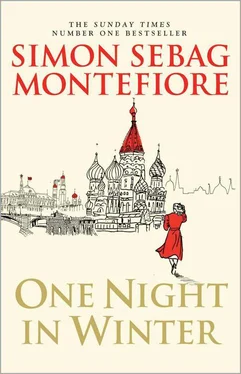‘Ludicrous children,’ agreed Mogilchuk.
‘And they died for this childish pantomime.’ Kobylov rubbed his face wearily. ‘Come on, comrade. Before we report, we need one more piece of the puzzle.’
‘Now, George,’ persevered Mogilchuk. ‘We’re nearly there. But I need to ask you about the murder weapon. It was a Mauser service pistol and we found it on the ground. Now we know who killed who—’
‘Nikolasha killed Rosa, the bastard,’ George replied eagerly.
‘Just answer the fucking question, boy. Did Nikolasha have a pistol?’
George leaned back in his chair. ‘I have no idea. I’m sure his parents have guns in the house.’
‘I’m sure they do too. But suppose it wasn’t Nikolasha who fired the Mauser at all. Suppose it was Rosa.’
‘Did you see Rosa with a Mauser pistol, prisoner?’ Kobylov asked Minka.
‘No. Nikolasha was the one obsessed with guns and death.’
‘So did you see Nikolasha with a pistol?’
‘Yes.’
‘A duelling pistol?’
Minka put her head in her hands to think. When she looked up again, Kobylov could see that she was so tired she wasn’t focusing properly.
‘No,’ she said slowly. ‘It was a real pistol.’
Kobylov smiled. At last they were getting somewhere. ‘Where did he get that?’
Minka looked worried suddenly. ‘I don’t know.’
‘So how did you see the Mauser?’
‘I was watching Nikolasha as he took the duelling pistols out of their case before the Game started. He put the real pistol in their place.’
‘Did he plan to use the real pistol – but changed his mind at the last moment?’
‘Possibly. He believed all sorts of stupid things. He said the duel was the front line between ordinary life and extraordinary romance.’ Tears began to run down Minka’s face again. ‘He used to say things like that. Perhaps a real gun would have made it even more real.’
‘Don’t hide anything from us, Andrei,’ said Mogilchuk. ‘You know that your mother is all alone. She is worried, Andrei. You’re all she has left.’
‘How did Nikolasha get hold of that pistol?’ asked Kobylov.
‘After the dinner at Aragvi, in the car park, Nikolasha asked if any of us had a gun.’
‘Why would he ask that?’
Andrei shrugged. ‘He said silly things all the time. He said, “Death is better than routine.” Total nonsense.’
‘And did anyone have a gun?’
Andrei hesitated, staring down at the table.
‘I’d hate to see your mother on the trains for Norilsk,’ insinuated Mogilchuk. ‘Most people never arrive in the camps. They die on the way and when the train slows down, the other prisoners throw out the bodies. Did you know that, Andrei?’
‘No.’ He was shaking.
‘Think, Andrei – who is more important to you? Your mother or those rich kids?’
Andrei sat up and looked directly at Mogilchuk. ‘Nikolasha asked George, who said he didn’t have a gun. But his father’s bodyguards did.’
Kobylov sat down beside Vlad Titorenko and put his arm around him. ‘You see? This can be fun. Now, where did Rosa get the gun?’
‘Rosa? I never saw her with it.’
‘But you saw her open the gun case?’
‘Yes.’ Vlad was whispering.
‘Which Rosa picked up. That was how she got the gun,’ said Kobylov slowly.
‘But Rosa loved Nikolasha,’ said George. ‘She was never interested in guns. She never hurt a fly.’
Kobylov and Mogilchuk were facing George. ‘Leave the detective work to us, George,’ said Kobylov, twirling the rings on his fingers. It was early morning and somewhere above the ramparts of Lubianka the horizon was glowing with light. Soon they’d have him and they could go home. ‘Who gave Nikolasha the Mauser in the first place?’
A twitch. Like the first bite of a fish at the end of a line. Kobylov glanced at Mogilchuk and noticed his swollen jaw.
‘I don’t know.’
Kobylov leaned forward on his elbows so that George could almost taste his spicy breath – and feel his power.
‘Did you give Nikolasha that gun, prisoner?’
George was sweating. His confidence, his entitlement, his very will to exist seemed to have melted away. He was just scared, a scared child in serious trouble, and Kobylov was pleased.
‘But you said Rosa shot Nikolasha. I never gave her a gun. I swear it!’
‘We know where Rosa got the gun. From the case. And we know how the gun got in the case. Nikolasha put it there. So how did Nikolasha get it?’
George doubled up and began to sob. Kobylov leaned in for the kill.
‘Oh my God! My father’s going to kill me.’
‘Forget your father, George. We don’t care who your father is. He could be the King of England for all we care. We have orders from the Central Committee to grind you to camp dust if we have to. Now, let me ask you again: did you give—’
‘Yes,’ George shouted. ‘I gave Nikolasha that pistol. He asked for it and I thought nothing of it. My father has a pistol. My brother has a pistol. Half Moscow has them, I thought. He could have got one anywhere.’
‘But he didn’t get one from anywhere, did he, George? He got one from you.’
George nodded, his face swollen from weeping.
‘And where did you get it? Did you go into your father’s office and take it? Does the Mauser that killed two children belong to him?’
George sat very still, then he leaned across the desk and vomited.
FROM THE MOMENT he arrived at Stalin’s Nearby Dacha earlier that night, Satinov could only think of his son.
Stalin, the Seven leaders and Poskrebyshev sat at the long table in the gloomy wood-panelled dining room. They were discussing the coming war against Imperial Japan, but all Satinov could think about was what George was doing. Sleeping? More interrogations? George, his impertinent son; his undutiful, un-Bolshevik son; yes, his favourite son.
‘May we come in?’ Valechka Istomina, Stalin’s cheerful housekeeper, and her assistants, plump ladies in white smocks like nurses, wheeled in the dinner: a Georgian feast with shashlik kebabs. They laid out the dishes on the side table. Valechka waddled right over to Stalin. ‘It’s all ready for you, Josef Vissarionovich,’ she said indulgently. She was right at home with him. ‘Just as you like it!’
‘Thank you, Valechka. Go and pour yourself a glass of Telavi. You deserve it.’ Stalin treated the housekeeper like family, and Satinov sensed their bond was closer than anyone knew. ‘Come.’ Stalin raised his hands to Satinov and the others. ‘Help yourselves!’
The leaders followed him to the sideboard.
‘Is everything well, bicho ?’ Stalin was right beside him, ladling out the lobio and then soaking it up with bread.
‘Yes, of course,’ he replied – except my son is in prison, as you very well know, he thought drily.
‘Tamriko’s on good form? Still teaching English?’
‘Very much so.’
‘The family?’ Stalin gazed right into his eyes, challenging him to mention George, to beg for forgiveness, to intercede and break all the rules, to reveal some bitterness that would taint the whole family and bring about their total destruction. Don’t hesitate in a single answer, Satinov told himself. Don’t evade his eyes. You have nothing to hide from Stalin, not even a whisper of resentment.
‘Everything is as it should be,’ he answered steadily.
Stalin’s hazel eyes did not leave him. ‘Good! Help yourself to dinner.’
Satinov exhaled. Stalin’s cold, compressed ferocity never ceased to awe him.
After food: toasts. Stalin mocked Beria for not eating the shashlik s: ‘Still eating that grass? You’re turning into a breed of cow.’ Then he teased the triple-chinned Malenkov: ‘Eat less! I suggest calisthenics with Satinov.’
Читать дальше












